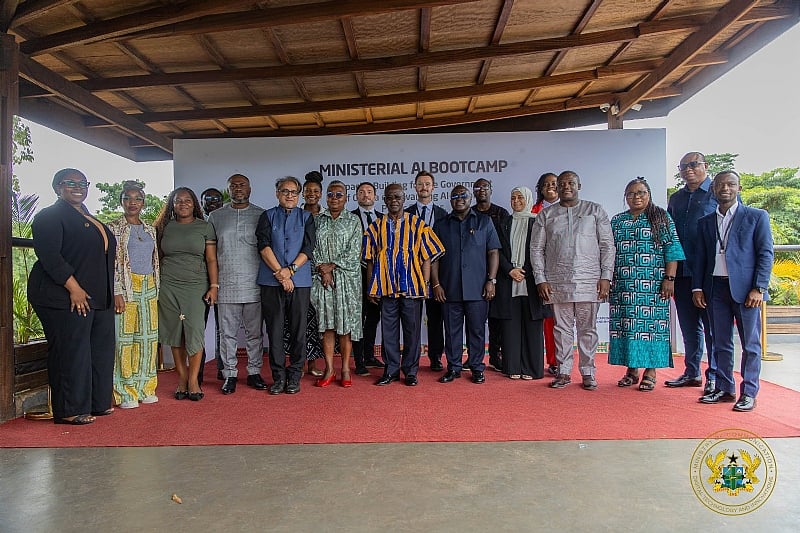Ghana’s government has embarked on a groundbreaking initiative to integrate artificial intelligence (AI) into its national development strategy. This ambitious undertaking, manifested in a three-day AI Bootcamp for Cabinet Ministers and key government officials, signifies a bold step towards transforming public service through innovation. The Bootcamp, spearheaded by the Ministry of Communication, Digital Technology and Innovations in collaboration with the United Nations Development Programme (UNDP), underscores Ghana’s commitment to positioning itself as a leader in Africa’s digital revolution. The program’s core objective is to equip government leaders with the strategic understanding necessary to leverage AI’s transformative potential across various sectors, ultimately enhancing governance, service delivery, and national security. This initiative marks a significant milestone in Ghana’s journey towards a future where technology plays a central role in national progress.
The driving force behind this transformative initiative is the recognition that AI is no longer a futuristic concept but a present-day reality with the power to revolutionize governance. Hon. Samuel Nartey George, the Minister of Communication, Digital Technology and Innovations, has emphasized the urgency of embracing AI as a national imperative. He envisions AI’s integration into strategic institutions, including foreign missions, to bolster data analysis and enhance screening processes. The Bootcamp is designed to empower policymakers with the knowledge and vision to navigate the complexities of this rapidly evolving technological landscape, ensuring Ghana remains at the forefront of innovation. The focus is not on transforming officials into programmers, but rather on equipping them with the understanding necessary to make informed policy decisions in the age of AI.
The Bootcamp’s structure is meticulously designed to ensure practical outcomes. Ministers, Ministers of State, and designated AI focal persons from all ministries are participating in collaborative sessions to develop AI-driven solutions tailored to their specific mandates. Each ministry is tasked with formulating concrete AI use cases and developing a roadmap for implementation, which will subsequently be integrated into their performance indicators. This hands-on approach ensures that the training translates into tangible actions, driving real-world change within each ministry. The expectation is for ministries to emerge from the Bootcamp with actionable plans, ready to integrate AI into their operations, ultimately contributing to a more efficient and effective government.
The Bootcamp enjoys strong support from the highest levels of government, including President John Dramani Mahama, who has mandated that AI deployment be treated as a government-wide priority, transcending individual ministries. This top-down approach emphasizes the importance of cross-sectoral collaboration and ensures that AI integration becomes a shared responsibility across all government departments. The Chief of Staff, Hon. Julius Debrah, further solidified this commitment by announcing that the AI initiatives developed during the Bootcamp would be formally adopted as Key Performance Indicators (KPIs) for all Ministries. This integration of AI initiatives into performance metrics underscores the government’s dedication to making AI a core component of its operations.
Practical examples of AI’s potential impact on various sectors abound. The Ministry of Health, for instance, could leverage AI to establish a national health intelligence hub capable of tracking and predicting outbreaks of communicable diseases in real-time. Such a system could revolutionize healthcare delivery by enabling proactive interventions and more effective resource allocation. This illustrative example highlights the transformative potential of AI across diverse sectors, from healthcare to national security, demonstrating its capacity to address critical national challenges. By fostering innovation and encouraging the development of tailored AI solutions, the Bootcamp aims to unlock the full potential of AI for the benefit of Ghana’s citizens.
The AI Bootcamp signifies a new era of intelligent governance in Ghana, one that prioritizes innovation and accountability. By empowering its leaders with the knowledge and tools to harness AI’s potential, Ghana is laying the foundation for a smarter, more resilient nation. The collaborative approach, coupled with the integration of AI objectives into performance metrics, ensures that the initiatives developed during the Bootcamp translate into tangible improvements in governance and service delivery. This initiative demonstrates Ghana’s commitment to embracing cutting-edge technology to address national challenges and drive progress, setting a precedent for other nations seeking to leverage AI for national development. The Bootcamp represents not just a training program, but a strategic investment in Ghana’s future, paving the way for a digitally empowered and innovative nation.














